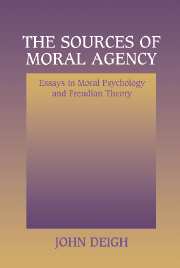Book contents
- Frontmatter
- Contents
- Preface
- Sources
- Abbreviations
- Dedication
- 1 Morality and personal relations
- 2 On the right to be punished: Some doubts
- 3 Love, guilt, and the sense of justice
- 4 Remarks on some difficulties in Freud's theory of moral development
- 5 Freud's later theory of civilization: Changes and implications
- 6 Freud, naturalism, and modern moral philosophy
- 7 Reason and motivation
- 8 Empathy and universalizability
- 9 Sidgwick on ethical judgment
- 10 Reason and ethics in Hobbes's Leviathan
- 11 Shame and self-esteem: A critique
- Index
10 - Reason and ethics in Hobbes's Leviathan
Published online by Cambridge University Press: 04 December 2009
- Frontmatter
- Contents
- Preface
- Sources
- Abbreviations
- Dedication
- 1 Morality and personal relations
- 2 On the right to be punished: Some doubts
- 3 Love, guilt, and the sense of justice
- 4 Remarks on some difficulties in Freud's theory of moral development
- 5 Freud's later theory of civilization: Changes and implications
- 6 Freud, naturalism, and modern moral philosophy
- 7 Reason and motivation
- 8 Empathy and universalizability
- 9 Sidgwick on ethical judgment
- 10 Reason and ethics in Hobbes's Leviathan
- 11 Shame and self-esteem: A critique
- Index
Summary
Hobbes's ethics teaches the ways of self-preservation. Its lessons are arranged in a system of rules that Hobbes understood to be the laws of nature. These two themes, self-preservation and natural law, have inspired opposing interpretations of Hobbes's text. The historically dominant and still prevailing interpretation, which develops the former theme, is that Hobbes's ethics is a form of egoism. A later and less popular interpretation, which develops the latter theme, is that his ethics is a system of absolutes, “a strict deontology.” These two interpretations represent a dispute between what I will call orthodoxy and dissent in Hobbes scholarship. The dispute chiefly turns on two questions: What is the basis of Hobbes's ethics, and how stringent are the rules it comprises?
Orthodoxy takes Hobbes's ethics to be based on his moral psychology, specifically, his theory of motivation. That theory, on the orthodox reading, is thoroughly egocentric. It holds that all voluntary action springs from self-interest. Hence, on this reading, one can attribute to Hobbes the view that a person's well-being, since it is the ultimate end of all voluntary action, is the only end at which it makes sense for that person to aim. Accordingly, the laws of nature are to be understood as rules for achieving this end.
- Type
- Chapter
- Information
- The Sources of Moral AgencyEssays in Moral Psychology and Freudian Theory, pp. 198 - 225Publisher: Cambridge University PressPrint publication year: 1996



